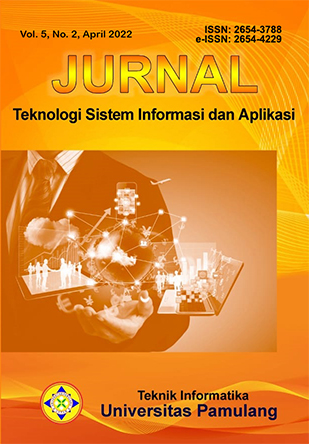Pengujian Sistem ERP Apotek (GPOS - POS Modul) Menggunakan Metode Black Box dengan Teknik Error Guessing
DOI:
https://doi.org/10.32493/jtsi.v5i2.17654Keywords:
software, testing, pos, blackboxAbstract
After the process of making software needs to be done a useful testing stage to ensure that the software (Software) is in accordance with the needs of the user. POS is an application used to make sales transactions. In this study, the test was conducted on four modules: the first is the inventory module, in this module there are features for the manager of goods data, stock of goods, and the price of goods, The second is the purchase module where this feature will manage every transaction of goods purchased to the supplier or manufacturer, the third is the sales module or POS, this feature is designed to manage every sales transaction to the customer or end user, and the last is the report module, where every transaction both sales and purchases and inventory data (items, stock, the price) will be recorded in detail in it. Each of these modules is arranged thus completing one cycle of business processes. Because of the complexity of the arrangement of logic forming sales transactions, the process of calculating the price of sales and calculating the value of stock goods causes losses for business people who use invalid systems. As for a case in true testing it's when we find a previously undisclosed error. The research phase begins by analyzing each function on the system to be tested, creating a testing scenario for the database structure that has been created, making documentation from the test results and the researcher concludes. From the results of the tests that have been done, it was concluded that this software is worth using.References
Cholifah, W. N., Yulianingsih, & Sagita, S. M. (2018). Pengujian Black Box Testing pada Aplikasi Action & Strategy Berbasis Android dengan Teknologi Phonegap. Jurnal String, 206-210.
Febrian, V., Ramadhan, M. R., Faisal, M., & Saifudin, A. (2020). Pengujian pada Aplikasi Penggajian Pegawai dengan menggunakan Metode Blackbox. Jurnal Informatika Universitas Pamulang, 5(1), 61-66. doi:10.32493/informatika.v5i1.4340
Khasanah, R. L., Kesuma, C., & Wijianto, R. (2018). Sistem Informasi Pelayanan Kesehatan Online Berbasis Web Pada PMI Kabupaten Purbalingga. Evolusi : Jurnal Sains dan Manajemen, 6(2), 74-83. doi:10.31294/evolusi.v6i2.4441
Kurniawati, P. (2018, 11 27). Test Case Dalam Pengujian. Diambil kembali dari Medium: https://medium.com/skyshidigital/test-case-dalam-pengujian-81479abb9a4d
Ningrum, F. C., Suherman, D., Aryanti, S., Prasetya, H. A., & Saifudin, A. (2019). Pengujian Black Box pada Aplikasi Sistem Seleksi Sales Terbaik Menggunakan Teknik Equivalence Partitions. Jurnal Informatika Universitas Pamulang, 125-130.
Nugraha, B. F., Aditama, F., Arrofi, M., Ahmad, S. U., & Yulianti, Y. (2020). Pengujian Black Box pada Aplikasi Penghitungan Parkir Swalayan ADA Menggunakan Teknik Equivalence Partitions. Jurnal Informatika Universitas Pamulang, 5(2), 146-151. doi:10.32493/informatika.v5i2.5350
Nurudin, M., Jayanti, W., Saputro, R. D., Saputra, M. P., & Yulianti, Y. (2019). Pengujian Black Box pada Aplikasi Penjualan Berbasis Web Menggunakan Teknik Boundary Value Analysis. Jurnal Informatika Universitas Pamulang, 4(4), 143-148. doi:10.32493/informatika.v4i4.3841
Pamungkas, G., & Yuliansyah, H. (2017). Rancang Bangun Aplikasi Android POS (Point OF Sale) Kafe Untuk Kasir Portable dan Bluetooth Printer. Jurnal Sains dan Teknologi, 199-208.
Shaleh, I. A., Prayogi, J., Pirdaus, P., Syawal, R., & Saifudin, A. (2021). Pengujian Black Box pada Sistem Informasi Penjualan Buku Berbasis Web dengan Teknik Equivalent Partitions. Jurnal Teknologi Sistem Informasi dan Aplikasi, 4(1), 38-45. doi:10.32493/jtsi.v4i1.8960
Sugihartono, J., Satoto, K. I., & Widianto, E. D. (2015). Pembuatan Aplikasi Point of Sale Toko Cabang Perusahaan Torani Menggunakan Framework CodeIgniter. Jurnal Teknologi dan Sistem Komputer, 3(4), 445-455. doi:10.14710/jtsiskom.3.4.2015.445-455
Downloads
Published
How to Cite
Issue
Section
License
Copyright (c) 2022 Yulianti Yulianti, Endar Nirmala, Fernando David Hence Rotty, Eva Fauziah, Rizky Chaesar, Muhammad Rafif Misbahuddin

This work is licensed under a Creative Commons Attribution-NonCommercial 4.0 International License.
Authors who publish with this journal agree to the following terms:
- Authors retain copyright and grant the journal right of first publication with the work simultaneously licensed under a Creative Commons Attribution License that allows others to share the work with an acknowledgement of the work's authorship and initial publication in this journal.
- Authors are able to enter into separate, additional contractual arrangements for the non-exclusive distribution of the journal's published version of the work (e.g., post it to an institutional repository or publish it in a book), with an acknowledgement of its initial publication in this journal.
- Authors are permitted and encouraged to post their work online (e.g., in institutional repositories or on their website) prior to and during the submission process, as it can lead to productive exchanges, as well as earlier and greater citation of published work (See The Effect of Open Access).
Jurnal Teknologi Sistem Informasi dan Aplikasi have CC BY-NC or an equivalent license as the optimal license for the publication, distribution, use, and reuse of scholarly work.
In developing strategy and setting priorities, Jurnal Teknologi Sistem Informasi dan Aplikasi recognize that free access is better than priced access, libre access is better than free access, and libre under CC BY-NC or the equivalent is better than libre under more restrictive open licenses. We should achieve what we can when we can. We should not delay achieving free in order to achieve libre, and we should not stop with free when we can achieve libre.
This work is licensed under a Creative Commons Attribution-NonCommercial 4.0 International (CC BY-NC 4.0) License
YOU ARE FREE TO:
- Share - copy and redistribute the material in any medium or format
- Adapt - remix, transform, and build upon the material for any purpose, even commercially.
- The licensor cannot revoke these freedoms as long as you follow the license terms



_2020_-_7(2)_2024_-_Thumbnail.png)












